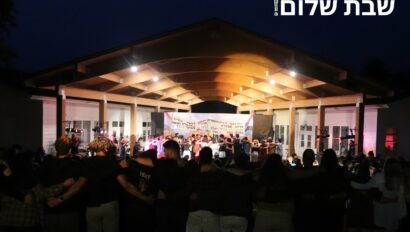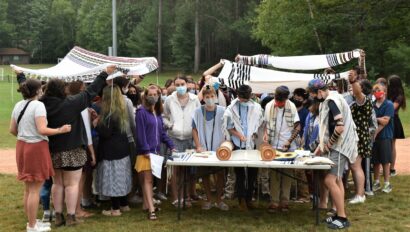Please enjoy a D’var Torah this week from Jared Skoff, Rosh Tikvah 2017 and 2018. Originally from Cleveland, Jared spent the past four summers at Ramah Wisconsin, after working at Ramah Canada for three summers. This is Jared’s third year working year-round for Camp Ramah, first as a Ramah Service Corps Fellow in Detroit, and now as the Program Director at the National Ramah headquarters in New York City.
Save Pluto
by Jared Skoff
Our maps are wrong, you know.
The map of the United States you learned in school? Wrong.
There are two ways we determine the shapes and sizes of our geography – maps and satellite photos. And if you look at the satellite photos of the state of Louisiana, due to a century of coastal erosion, it is missing about 2,000 square miles of land from its iconic “boot” that you still see on every globe, map, and textbook – we never bothered to change them. They’re wrong.
When I was growing up, Pluto was a planet. We had nine planets – My Very Educated Mother Just Served Us Nine Pizzas. Those aren’t the names of the planets, that was the mnemonic device we learned for Mercury, Venus, etc. until we got to the smallest and most distant planet – Pluto.
In 2006, we learned that Pluto was no longer a planet. The International Astronomical Union (IAU) told us that we had been wrong all this time. We had to come up with a new mnemonic device, and as a middle school student I had to confront the idea that nothing in life is sacred or permanent. Not even the shape of Louisiana. Not even our solar system.
This Shabbat is sandwiched between two holidays that challenge our status quo. We all have a set of assumptions that we take for granted as truth, reality, “the way it is.” And on Yom Kippur and Sukkot, our tradition forces us to set aside our comfortable routine, and change our daily reality. On Yom Kippur, we encounter hunger. During the Yizkor service we confront loss. And on Sukkot, we catch a glimpse of life without the stability of home.
How do we react when “the way things are” changes drastically? We all have solar systems and coastlines in our lives that we picture a certain way – do we redraw our maps or leave them the way they used to be? Sometimes we switch schools, or move cities, or our heroes turn out to be rotten people, or our job is not what we thought it would be, or our friend isn’t as reliable as we expected, or we find out that our favorite planet is not really a planet.
Other times, the things we deem impermanent are built to last.
When Jacob is on the run from his brother Esau, he finds a resting place to stay for the night. He has his famous dream about a ladder ascending to heaven, and he wakes up and exclaims, “Surely God is in this place, and I did not know it.” Rashi asserts that this is the future spot of the Temple Mount in Jerusalem; what Jacob thinks is a temporary napping place turns out to be the future spiritual home of the Jewish people.
Likewise, Ramah is a passing moment, a seasonal fraction of our year, that becomes permanent. At Camp Ramah, every member of the community grows to cherish the limited time we have together. We return to our home communities with fresh perspective, a reinvigorated sense of togetherness, and a renewed appreciation for a firm mattress. Like the sukkah, Ramah is a temporary space that inspires us to redefine our understanding of home. And also like the sukkah, Ramah becomes an annual space – both temporary and consistent – for us to question and change our status quo.
At times, our temporary becomes more permanent. Our summer bunkmate becomes a lifelong friend. The activity we stopped by one day becomes our hobby. The person we overlook turns out to be the one we can rely on most. The internship becomes a job. Or our favorite celestial body is reinstated as a worthy member of the solar system.
This past week, CNN and other sources announced that Pluto is a planet, and always has been. The IAU was wrong. Surely God was with Pluto, and we did not know it.
Shabbat shalom, and Chag sameach.






